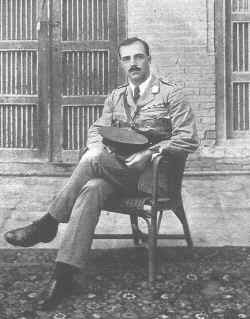Arnold Wilson (Arnold Talbot Wilson)

Arnold Wilson was born in 1884 and educated in England at Clifton College, where his father James Maurice Wilson was a headmaster. His younger brother was the tenor Sir Steuart Wilson. Wilson was tall and strong. He began his military career as an army officer 19 August 1903, having been awarded the King’s Medal and sword of honour at the Royal Military Academy Sandhurst, being commissioned on the Unattached List for the Indian Army. After he spent a year attached to the 1st battalion the Wiltshire regiment in India, he was appointed to the British Indian Army and posted to the 32nd Sikh Pioneers, on 18 December 1904. In 1904, he went to Iran as a Lieutenant to lead a group of Bengal Lancers to guard the British consulate in Ahvaz and to protect the work of the D’Arcy Oil Company, which had obtained a sixty-year oil concession in Iran and was pursuing oil exploration in partnership with the Burma Oil Company. In 1907, Arnold Wilson was transferred to the Indian Political Department and sent to the Persian Gulf, where he served as a political officer, Wilson oversaw the discovery of the first oil site in the Middle East, Masjid-i-Suleiman in 1908. Soldier and senior administrator as Consul-General of Muhammerah (1909–11): he was put in charge of the Turko-Persian Frontier Commission. He looked like the traditional figure of the Indian Rebellion of 1857 in a top buttoned bright red tunic, the Indian Army uniform. “His flashing eyes, his beetling eyebrows, his close-cropped hair, his biblical quotations”, recalled Gertrude Bell, The British “Oriental Secretary”. Wilson was a hard worker, a workaholic, who was tirelessly energetic, shifting mountains of paperwork. He inspired a younger colleague Harry Philby, while Hubert Young, a favoured subordinate found him domineering.
In January 1915 as the British were moving troops from India into Mesopotamia through the Persian Gulf and Basra, Arnold Wilson was designated as the assistant, and then deputy, to Sir Percy Cox, the British Political Officer for the region. Based in Baghdad, he then became the acting Civil Commissioner for Mesopotamia. The problem remained that there was no official “Arab Policy” it had not been defined in law nor by the Civil Service. India wanted Mesopotamia as a Province; but Arabists from Cox downwards wished for a semi-autonomous policy separate from the Arab Bureau in Cairo. Policy was made ad hoc; but Wilson disagreed. During his tenure in Mesopotamia, Wilson worked to improve the country’s administration according to the principles he learned in India. In Wilson’s views, the priority was to reconstruct and stabilize the country, by establishing an efficient government and administration as well as a fair treatment and political representation of the various ethnic and religious communities (i.e. in the case of Iraq: Arabs, Kurds, Persians, of religions such as Islam Shiite and Sunni, Christianity and Judaism). In doing so, he was nicknamed “The Despot of Mess-Pot”.
However, after World War I he found himself progressively opposed to other British officials who believed that Arab countries should be granted independence under British supervision. In 1919, during the Paris Peace Conference which followed World War I, he was among the few who successfully recommended adopting the Arabic name Iraq, as it had been known for more than 1400 years by Muslim and Arab worlds, instead of the Greek name Mesopotamia which was only used by Westerners. This political entity covered the planned northern expansion of the newly created country under the British Mandate to include the oil rich Mosul region of Kurdistan, in addition to the Mesopotamian provinces of Baghdad and Basra. In April 1920, at the Conference of San Remo, the League of Nations agreed to the British mandate over Iraq. In the spring and summer of 1920, various riots erupted across central and southern Iraq. These riots were often violently repressed by Wilson’s administration. The total number of Iraqi casualties of these riots was estimated at 10,000 people. Having achieved the rank of Brevet Lieutenant-Colonel in August 1918, Arnold Wilson retired from the Indian Army in August 1921. In the summer of 1920, Wilson proposed a compromise, suggesting that Feisal, the former King of Syria, be offered the Iraqi throne. This proposal was intended to obtain support from the Iraqis as well as British officials who favored semi-independence. It was eventually accepted by the British government, but Wilson was not there to participate in its implementation. The British government decided not to follow Wilson’s views, and instead granted independence to Iraq. The British government removed Wilson from his position in Iraq and knighted him. Deeply disappointed by the turn of events, he left the public service and joined the Anglo-Persian Oil Company as manager of their Middle Eastern operations. He worked for the company until 1932.
Born
- July, 18, 1884
- France
Died
- May, 31, 1940
- Eringhem, France
Cemetery
- Eringhem Church
- Eringhem, France

